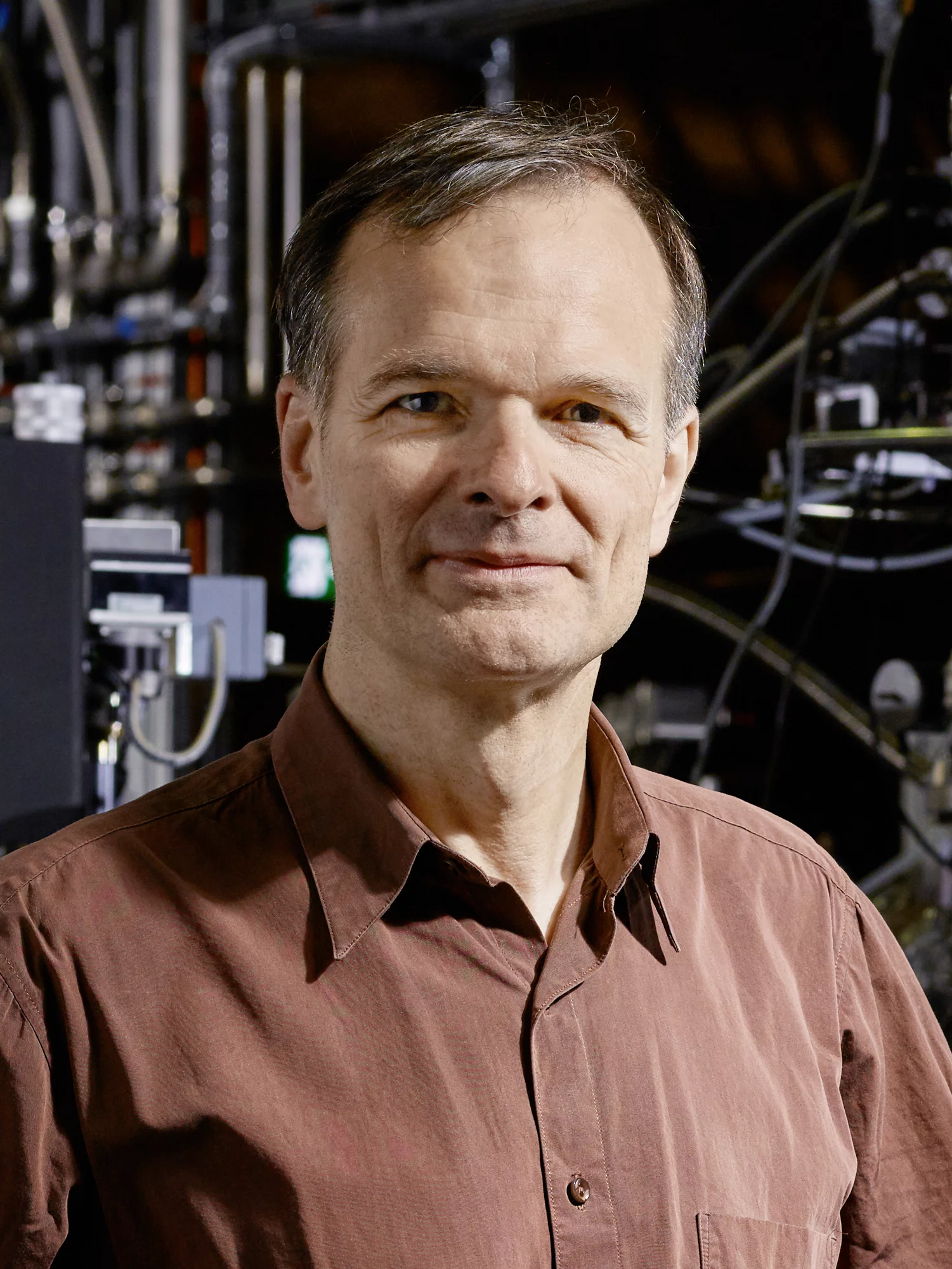Interview: Gabriel Aeppli
«Every day counts in the battle against the virus»
The outbreak of the coronavirus pandemic has changed the way research is carried out at PSI but has not brought it to a standstill. Gabriel Aeppli, head of the Photon Science Division at PSI, talks about the exceptional threat that Covid-19 represents and how PSI researchers are studying this new virus at SLS, and possibly soon at SwissFEL as well.
Mr. Aeppli, we are conducting this call by videoconference, and you have placed a pretty picture of California's Golden Gate Bridge in the background. But where are you actually?
Gabriel Aeppli: I am actually in my apartment in Zurich. Like almost everyone at PSI, I now work a lot from home. But I go to the institute at least twice a week to talk to the people at the beamlines. Of course, we always keep our distance from each other. But the staff should know that I will continue to take care of them and, for example, answer their questions directly.
How is the research currently proceeding at PSI's two X-ray sources, the Swiss Light Source SLS and the X-ray free-electron laser SwissFEL?
In the course of enacting the social distancing measures, we shut down SwissFEL in March, but we kept the SLS running. At the time, it appeared more difficult for us to keep SwissFEL up and running without the staff getting too close while they were working. Unfortunately, this means that we had to slow down work on Athos, the next SwissFEL beamline, which is currently being installed. It was precisely there that, for certain processes, many people would have needed to be in the same place. Because of that, we have revised the processes. And we are still discussing how we can start up SwissFEL again soon.
So is it possible that research on the coronavirus could also be carried out at SwissFEL?
Yes, this is possible for experiments that follow the social distancing measures or that can be carried out remotely. Then we would continue to work on the installation of Athos as well as running experiments again on the existing SwissFEL beamlines. Of course, these beamlines would then be made available with the highest priority for current research on the coronavirus.
How do you personally view the urgency of this research?
This research is very urgent, so we are making every effort to help with all means available to us.
At SLS, even the customary break during the Easter holidays was postponed.
Yes, and that's a good thing. The operation of the SLS certainly costs money. And of course, the fact that we have now postponed the Easter shutdown indefinitely adds to the cost. Nevertheless, there's no comparison between this and the costs in other areas, such as the current daily loss of business in the Swiss hotel industry. Or the overall economic losses worldwide. So if we at PSI can contribute to finding a drug or a vaccine more quickly, we absolutely have to do it. In the end, every single day we gain in the battle against this virus will be worth it.
Do the other PSI researchers see it that way, too?
Yes, fortunately I really can confirm that. All members of the PSI staff have understood that there is a crisis and have implemented everything necessary to confront this new situation. The general mood is positive. Under the now changed circumstances, they're working as hard as ever. The researchers, too, are not afraid to come to the laboratory if necessary. And I have seen that PSI researchers from various scientific areas immediately started to consider how their expertise might help and how they could put their science at the service of coronavirus research.
Do you think some of the current changes in PSI operations will become established long-term?
Yes, definitely with regard to digital solutions such as videoconferencing. I think one thing we can learn from this whole story is that we don't need to take the airplane so often. And that's really good in terms of CO2 emissions. Because both this virus and climate change are major challenges. From my sober point of view as a scientist, I would even say that the virus is bad for many people, but not existentially for humanity. By contrast, climate change is an existential threat for all of humanity. The virus has now forced us to live in a way that conserves the planet's resources, for example by traveling less. It's an exercise, in a way. It has forced us to take measures that we may need to use in the long run to effectively combat climate change. Only against climate change, we have for too long avoided taking action because we – rich countries like Switzerland – are not in a comparable immediate emergency situation as is now the case with the coronavirus.
Are you yourself affected by this too?
Absolutely. Before the coronavirus pandemic, I was on the airplane every two weeks. And I don't miss that. So much can be accomplished just as well digitally. A few days ago, we had a lecture with 40 or 50 participants by videoconference. It worked quite well!
Interview: Paul Scherrer Institute/Laura Hennemann
Contact
Prof. Dr. Gabriel Aeppli
Head of the Photon Science Division
Paul Scherrer Institute, Forschungsstrasse 111, 5232 Villigen PSI, Switzerland
Telephone +41 56 310 42 32, e-mail: gabriel.aeppli@psi.ch [German, English, French]

